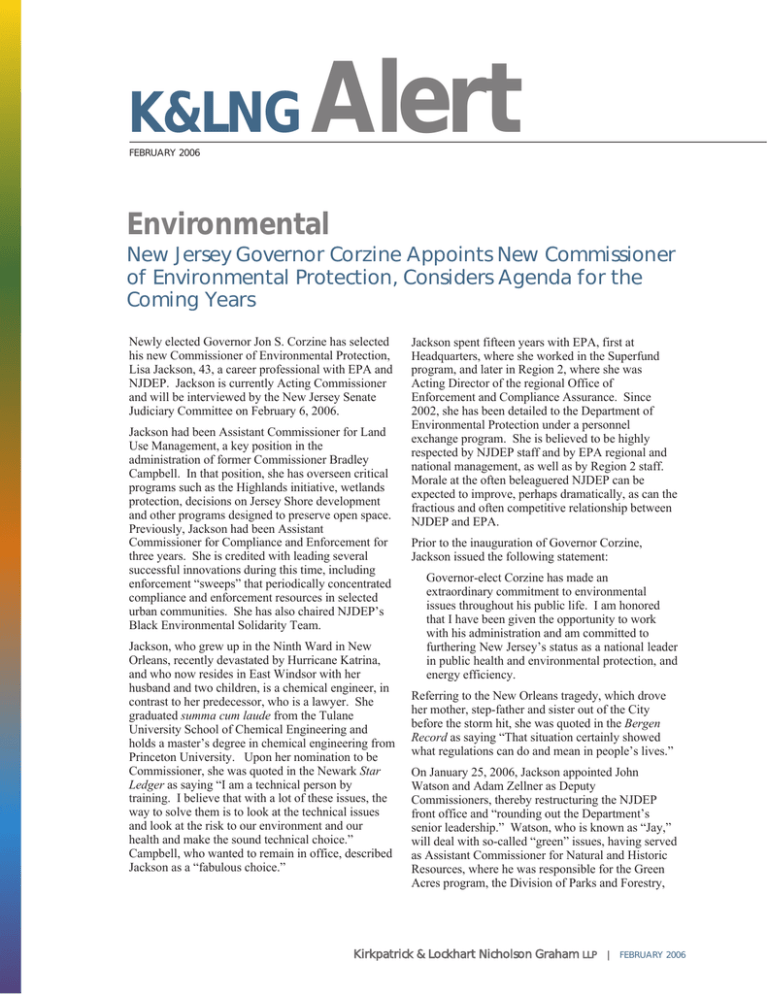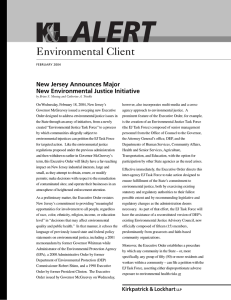
K&LNG
FEBRUARY 2006
Alert
Environmental
New Jersey Governor Corzine Appoints New Commissioner
of Environmental Protection, Considers Agenda for the
Coming Years
Newly elected Governor Jon S. Corzine has selected
his new Commissioner of Environmental Protection,
Lisa Jackson, 43, a career professional with EPA and
NJDEP. Jackson is currently Acting Commissioner
and will be interviewed by the New Jersey Senate
Judiciary Committee on February 6, 2006.
Jackson had been Assistant Commissioner for Land
Use Management, a key position in the
administration of former Commissioner Bradley
Campbell. In that position, she has overseen critical
programs such as the Highlands initiative, wetlands
protection, decisions on Jersey Shore development
and other programs designed to preserve open space.
Previously, Jackson had been Assistant
Commissioner for Compliance and Enforcement for
three years. She is credited with leading several
successful innovations during this time, including
enforcement “sweeps” that periodically concentrated
compliance and enforcement resources in selected
urban communities. She has also chaired NJDEP’s
Black Environmental Solidarity Team.
Jackson, who grew up in the Ninth Ward in New
Orleans, recently devastated by Hurricane Katrina,
and who now resides in East Windsor with her
husband and two children, is a chemical engineer, in
contrast to her predecessor, who is a lawyer. She
graduated summa cum laude from the Tulane
University School of Chemical Engineering and
holds a master’s degree in chemical engineering from
Princeton University. Upon her nomination to be
Commissioner, she was quoted in the Newark Star
Ledger as saying “I am a technical person by
training. I believe that with a lot of these issues, the
way to solve them is to look at the technical issues
and look at the risk to our environment and our
health and make the sound technical choice.”
Campbell, who wanted to remain in office, described
Jackson as a “fabulous choice.”
Jackson spent fifteen years with EPA, first at
Headquarters, where she worked in the Superfund
program, and later in Region 2, where she was
Acting Director of the regional Office of
Enforcement and Compliance Assurance. Since
2002, she has been detailed to the Department of
Environmental Protection under a personnel
exchange program. She is believed to be highly
respected by NJDEP staff and by EPA regional and
national management, as well as by Region 2 staff.
Morale at the often beleaguered NJDEP can be
expected to improve, perhaps dramatically, as can the
fractious and often competitive relationship between
NJDEP and EPA.
Prior to the inauguration of Governor Corzine,
Jackson issued the following statement:
Governor-elect Corzine has made an
extraordinary commitment to environmental
issues throughout his public life. I am honored
that I have been given the opportunity to work
with his administration and am committed to
furthering New Jersey’s status as a national leader
in public health and environmental protection, and
energy efficiency.
Referring to the New Orleans tragedy, which drove
her mother, step-father and sister out of the City
before the storm hit, she was quoted in the Bergen
Record as saying “That situation certainly showed
what regulations can do and mean in people’s lives.”
On January 25, 2006, Jackson appointed John
Watson and Adam Zellner as Deputy
Commissioners, thereby restructuring the NJDEP
front office and “rounding out the Department’s
senior leadership.” Watson, who is known as “Jay,”
will deal with so-called “green” issues, having served
as Assistant Commissioner for Natural and Historic
Resources, where he was responsible for the Green
Acres program, the Division of Parks and Forestry,
Kirkpatrick & Lockhart Nicholson Graham LLP |
FEBRUARY 2006
the Division of Fish and Wildlife and the Offices of
Engineering and Construction, Historic Preservation
and Natural Resource Restoration. He was also
responsible for the acquisition and preservation of
land for recreation and conservation purposes and for
the development of recreational facilities throughout
the state. He graduated from Florida A&M
University in Tallahassee and resides in
Lawrenceville with his wife and two children.
According to Jackson, Zellner, who had been
Executive Director of the New Jersey Highlands
Council, will be responsible for assisting her “in
formulating and executing our agenda over the next
four years,” bringing to bear his experience in smart
growth, land use and planning issues as well as his
“wide-ranging experience in government.” Before
leading the Highlands Council, Zellner had been
Executive Director of the Office of Smart Growth,
which processed $2 billion worth of redevelopment
projects during his tenure. Before that, Zellner had
been Chief of Staff for Congressman Steve Rothman
of the Ninth Congressional District, having also
worked for a number of state legislators. He
graduated from Rowan University and resides in
Linden with his wife.
At the time of these appointments, Jackson also
announced that more restructuring would be in the
offing, “in these times of austerity,” leading one to
wonder whether the current assistant commissioners,
or their positions, will be retained.
Shortly after her appointment, Jackson identified as
her priorities recruiting “new leadership talent” for
the NJDEP, environmental justice, “tough”
mandatory safety standards for chemical plants, air
quality, protection of drinking water resources, the
Regional Greenhouse Gas Initiative, energy
efficiency and renewable resources, “marrying”
Brownfield redevelopment with the land use
development program, TMDLs (particularly for
phosphorous), wildlife habitat preservation, and
NRD. She acknowledged that a long-anticipated
NRD rule would be forthcoming. She also said that
she thought a number of issues could “benefit from a
new set of eyes,” including NRD, the Passaic River,
chromium and Petty’s Island. Many of Jackson’s
priorities have also been identified as priorities by
Governor Corzine.
After his election, but prior to his inauguration,
Governor Corzine appointed an Environment
Transition Policy Group “to develop
recommendations for a six-month policy agenda.”
The 26-member Group, co-chaired by Valorie
Caffee, Organizing Director of WEC, Tom Gilmore,
President of the New Jersey Audobon Society, and
Eileen Swan, a member of the Highlands
2
Commission and former Mayor of Lebanon
Township, and dominated by NGO representatives,
issued its 12-page “Final Report” on January 10,
2006. The Group made thirteen major
recommendations. First, the Group recommended
that the Governor “reduce air pollutants from
stationary and mobile sources” by immediately
implementing the diesel engine retrofit program
enacted last year, and by convening a carbon dioxide
task force by the summer of 2006. Second, the
Group recommended that the Governor “protect New
Jersey’s drinking water supply” by expanding
“Category One” protection to additional water
bodies, updating the 1996 Water Supply Master Plan,
by integrating and strengthening all the State’s water
rules, by widening buffers around critical streams, by
drafting regulations on community-used pesticides
and by increasing watershed conservation funding
through water use fees. Third, the Group
recommended that the Governor “rehabilitate New
Jersey’s polluted waterways by demanding
environmental compliance,” by dedicating natural
resource damage “collections” to restoration of
natural resources in the communities of impact, by
making use of the extended statute of limitations for
natural resource damage claims, by clarifying and
reducing reliance on “in-kind” contributions to settle
NRD cases, by implementing the Lower Passaic
River/Newark Bay clean-up program, and by
strengthening the Raritan and Delaware River
initiatives. Fourth, the Group recommended that the
Governor “enforce compliance with wastewater
standards,” by using the portion of corporate
business tax receipts dedicated to water programs to
increase municipal aid for stormwater management,
and by proposing rules to strengthen waste water
management and water quality management by June,
2006. Fifth, the Group recommended that the
Governor “modernize the Department of
Environmental Protection” by developing a
coordinated, holistic review process for permits, by
ending policies on “substantive reliance” by
February, 2006, by encouraging worker participation
with NJDEP inspectors, by implementing strong
enforcement of regulated entities, by growing
revenues by reviewing existing leases on state-owned
properties, and by opposing budget cuts at NJDEP.
Sixth, the Group recommended that the Governor
“take action against polluters” by adopting a state
“Polluter Pays Act,” by reviving the Spill Fund by
creating a feedstock tax on particular industries, by
enhancing the NRD initiative by permitting common
law claims to be tried before juries, and by “restoring
NJDEP’s remediation authority to pre-1993 levels.”
Seventh, the Group recommended that the Governor
“protect and grow our State’s communities” by
opposing changes proposed by EPA to the toxic
release inventory reporting system, by making
Kirkpatrick & Lockhart Nicholson Graham
LLP
|
FEBRUARY 2006
Brownfields redevelopment a priority, by
strengthening the environmental justice Executive
Order through legislation, and by appointing a
chromium “master,” or “czar,” to coordinate the
cleanup of chromium in Jersey City. Eighth, the
Group recommended that the Governor “make public
health a central focus of environmental policy” by
fully implementing the Occupational Health Registry
and Environmental Public Health Advisory Group,
by creating an Office of Environmental Health, by
creating authority to halt or deny pollution permits in
communities known to have “disproportionate
amounts of polluting facilities,” and by providing
funding for innovative technology research and
development. Ninth, the Group recommended that
the Governor “protect and increase New Jersey’s
rural and urban open spaces” by immediately
repealing the controversial law enacted in 2004
known as “fast track,” by asking voters to renew the
Garden State Preservation Trust in the fall of 2006,
by directing NJDEP to use the Shore Protection Fund
to acquire vulnerable coastal properties, by
guaranteeing the preservation of open space in urban
redevelopment, and by closing a “loophole” that
allows preserved farms “to be paved over.” Tenth,
the Group recommended that the Governor
“strengthen scientific-based planning practices” by
moving the Office of Smart Growth back to the
Department of the Treasury, by creating a process to
streamline redevelopment and growth in urban areas,
by prioritizing the Highlands Master Plan, by reexamining the Pinelands Comprehensive Plan, by
closing “loopholes” in CAFRA, and by expanding
the trap/neuter/return program to control animal
populations with non-lethal methods. Eleventh, the
3
Group recommended that the Governor “protect
endangered species urban and rural habitats” by
adopting critical habitat modification rules and by
convening a task force to address urban habitats of
endangered species. Twelfth, the Group
recommended that the Governor “prioritize ecotourism and heritage tourism” by creating a “New
Jersey Natural Heritage and Cultural Treasures”
designation, by instituting a moratorium on
horseshoe crab harvest to protect the “red knot,” and
by widening public access to New Jersey’s public
lands. Finally, the Group recommended that the
Governor “become a steward of the State’s land” by
starting a statewide stewardship initiative to increase
protection and “attract Federal dollars,” by providing
a stable funding source for land stewardship, by
promoting non-lethal wildlife control and by
rewarding farmers for maintaining forested land.
Many of these recommendations are likely to viewed
as unfavorable, or even hostile, by business interests,
which were virtually unrepresented in the Group.
The questions remain whether the Governor will
embrace all or some of these recommendations,
especially given the unprecedented fiscal challenges
he has inherited, and whether the influence of the
Group will constrain Commissioner Jackson from
pursuing her own agenda. The full text of the Final
Report can be found at
www.nj.gov/governor/home/pdf/environment.pdf.
William Hyatt
whyatt@klng.com
973.848.4045
Kirkpatrick & Lockhart Nicholson Graham
LLP
|
FEBRUARY 2006
If you have questions or would like more information about K&LNG’s Environmental Practice, please contact
one of our lawyers listed below:
BOSTON
Michael DeMarco
NEWARK
617.951.9111 mdemarco@klng.com
William H. Hyatt, Jr.
DALLAS
NEW YORK
Robert Everett Wolin 214.939.4909 rwolin@klng.com
Donald W. Stever
HARRISBURG
PITTSBURGH
R. Timothy Weston
717.231.4504 tweston@klng.com
LOS ANGELES
Frederick J. Ufkes
212.536.4861 dstever@klng.com
412.355.8612 rhosking@klng.com
SAN FRANCISCO
310.552.5079 fufkes@klng.com
MIAMI
Daniel A. Casey
Richard W. Hosking
973.848.4045 whyatt@klng.com
Edward P. Sangster
415.249.1028 esangster@klng.com
WASHINGTON
305.539.3324 dcasey@klng.com
Barry M. Hartman
202.778.9338 bhartman@klng.com
www.klng.com
BOSTON • DALLAS • HARRISBURG • LONDON • LOS ANGELES • MIAMI • NEWARK • NEW YORK • PALO ALTO • PITTSBURGH • SAN FRANCISCO • WASHINGTON
Kirkpatrick & Lockhart Nicholson Graham (K&LNG) has approximately 1,000 lawyers and represents entrepreneurs, growth and middle market companies, capital
markets participants, and leading FORTUNE 100 and FTSE 100 global corporations nationally and internationally.
K&LNG is a combination of two limited liability partnerships, each named Kirkpatrick & Lockhart Nicholson Graham LLP, one qualified in Delaware, U.S.A. and
practicing from offices in Boston, Dallas, Harrisburg, Los Angeles, Miami, Newark, New York, Palo Alto, Pittsburgh, San Francisco and Washington and one
incorporated in England practicing from the London office.
This publication/newsletter is for informational purposes and does not contain or convey legal advice. The information herein should not be used or relied upon in
regard to any particular facts or circumstances without first consulting a lawyer.
Data Protection Act 1988—We may contact you from time to time with information on Kirkpatrick & Lockhart Nicholson Graham LLP seminars and with our regular
newsletters, which may be of interest to you. We will not provide your details to any third parties. Please e-mail cgregory@klng.com if you would prefer not to
receive this information.
© 2005 KIRKPATRICK & LOCKHART NICHOLSON GRAHAM LLP. ALL RIGHTS RESERVED.
Kirkpatrick & Lockhart Nicholson Graham
LLP
|
FEBRUARY 2006




